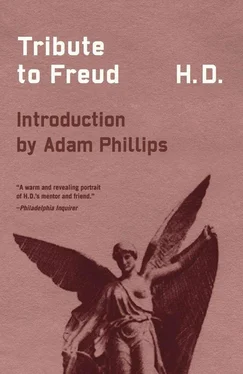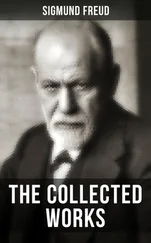It was an extremely large owl. It was very white. It lived under a bell-jar, it had large unblinking gold or amber eyes. I was suddenly reminded of the golden fur of the little Yofi lioness. If my grandfather gave me a lighted candle, my father gave me a snow-owl.
True, there was a qualification about this miracle, as there so often is in a true fairy tale. Yes, the owl was mine; it was mine for ever, he would not ask me to give it back to him. He had reproved one of us one day for being an “Indian-giver.” Someone rashly gave away a bag of marbles, a cock-a-doodle-do trumpet (a rooster of papier mâché whose head was like a Halloween false-face), or Joey from the Punch and Judy. Though individually the dolls were divided, the “show” was common property. There was a snag about some gift. “What is an Indian-giver?” “It is someone who gives something and asks for it back again.” But he wasn’t an Indian-giver. I could keep the snow-owl.
There was, however, this condition. I had told the Professor of the snow-owl. I told him there was one condition, and paused as if to emphasize the drama.
But perhaps it is an old trick.
The Professor said before I had time to tell him, “Ah — yes — he gave the owl to you, on the condition that it stayed where it was.”
But as I lie here, in my comfortable bed, in the Hotel Regina, I go on with my reverie. I am not preparing for tomorrow’s session, I am simply going on with today’s. By some curious freak of luck, a gardener brought me the tip of a cactus plant, to plant in a flower pot, in pebbles and sand. “Do not water it, it will grow best, right out in the sun; I have a huge plant, a tree really,” he told me. The gardener explained that he had grown his cactus tree from a slip just like the one he brought me. I was proud of my cactus plant and moved it about in the sun. It would grow into a tree.
It really wasn’t fair.
My three-inch strip of tough cactus fiber began to glow, it did not grow, it simply burst into a huge flower. It was like a red water-lily. Its petals were smooth and cold, though they should have been blazing. Well, perhaps they were. I thought the gardener would be so pleased. He said, “I have had my plant now for years and not a sign of a blossom.”
It wasn’t fair.
There was no rivalry about the butterfly, but that wasn’t fair either. For some reason, this giant worm had chosen a rather fragile stalk from my garden plot to build on. It may have been that the packets of our “cheap seeds” had been badly sifted or assorted and that some strange exotic had got in among them. But how did the worm get there? There was only one of the nicotiana plants. I broke off the stem and put it with what tobacco-flower leaves were left and placed the cocoon where I felt it would be safest, on the top of my father’s bookcase. The owl was one end, the other end was the Indian skull, at least we called it an Indian skull. It had been dug up or plowed up by him or by his father when our father was a boy in Indiana.
I know that I am in bed in the Regina Hotel, Freiheitsplatz, Vienna. I know that it is March 4, 1933. I am not sure but I think that this is my father’s birthday. He never wanted a “birthday” in our house, that seemed every other week to mark some festivity in mama’s or Mamalie’s Birthday Book or Text Book. I think this is my father’s birthday. He was younger than the Professor when he died, so perhaps it is natural, one way and another, to give the Professor the role of grand- or great-father, for all he is little-father or Papalie.
If I tell the Professor about the cactus and the butterfly, he will think I have made up one or the other, or both.
As I say, it was not quite fair, for I had had some slight converse with amateur experts, though I myself knew the name of not one butterfly. The thing that hatched out was a moth. It was exotic and enormous. It was literally the size of a not-so-small bird. It crawled or fluttered the length of the top shelf and settled on the Indian skull that my father or my grandfather had dug or plowed up when my father was a boy in Indiana.
My father and I agreed there was nothing to be done about it but to open the window and hope that it would fly out.
There is a bed-lamp, on the stand at my elbow. There is, I remember, a flattering soft-rose lamp-shade. If I switch on the light, I will see the length of green curtains, the comfortable green-upholstered arm-chair, glass-topped dressing-table, and the ordinary table with my books and papers.
I will have to switch on the light soon, for my eyes, staring into darkness, wonder if again I crossed the threshold. No, I am sure about the cactus. I am not quite sure about the butterfly.
I was wrong about the butterfly. I did not break off a heavy cocoon, but I gathered the enormous green caterpillar with the tobacco-flower stalk and placed the stalk and worm in a cardboard box. Did I cut holes in the box? There was ventilation somewhere. This was my own worm.
In the box, among the fresh green tobacco leaves, and the old brown tobacco leaves, he wove his huge cocoon.
How did he get out of the box? Did I hear him scratching?
Did he flutter and beat his wings against the box?
How did I get the cardboard box onto the top of the tall bookcase? Did I climb up on a chair? I was not tall enough to reach the top shelf, even with a chair.
Did I make it all up? Did I dream it? And if I dreamt it, did I dream it forty years ago, or did I dream it last night?
It was the huge green caterpillar that I gathered with the blossoming nicotiana.
I am wrong about my father’s birthday. My father’s birthday is in November.
Why did I say today, March 4th, is my father’s birthday?
Hibou sacré! I asked him how he was and he smiled a charming, wrinkled smile that reminded me of D. H. Lawrence. He told me (in French) how Napoleon’s mother used to say, even at the height of his fame, “That is all right as long as it lasts.” I spoke of the last war-year. He said he had reason to remember the epidemic, as he lost his favorite daughter. “She is here,” he said, and he showed me a tiny locket that he wore, fastened to his watch-chain. She had died of the epidemic in Hamburg, though the baby she had just had survived. I remembered Dr. Sachs speaking of this girl, “the beautiful Sophie.”
So the beautiful Sophie died, having her child about the same time as I was having mine, early spring 1919. I had the same Spanish influenza and though it was common knowledge that in no instance did both child and mother live after the depletion of pneumonia, yet I was the miraculous exception. It was not the child nor my critical physical condition that caused the final collapse.
But there was so much to tell. I dodged the actual details of my desolation and told the Professor how kind Havelock Ellis had been to me when I saw him in his flat in Brixton, those few times before the birth of my child. I had written to Dr. Ellis, although Daphne Bax who had arranged for me to stay in a cottage near her in Buckinghamshire, during the winter of 1919, had tried to discourage any idea of my meeting Havelock Ellis whom I so greatly admired. Mrs. Ellis had had a house at one time in Buckinghamshire, near Daphne. Daphne said, “Oh, Havelock — no one ever manages to meet Havelock. He is remote, apart, a recluse, a Titan, a giant.” Perhaps Daphne’s so taking things for granted spurred me to approach this Titan. I received a courteous note in answer to my letter to him, and the next time I made the trip from Princes Risborough to London, I went to see this Titan. He served China tea, with a plate of salted pecans and peanuts. There was an unexpected charm and authenticity in his artist décor. He wore a brown velvet smoking-jacket and showed me some of his treasures, a Buddha that his father, a sea captain, had brought back from China, a copy of a famous bust of himself done by — I forget who. There were various autographed photographs of people I had never met but heard of; Walt Whitman among others looked down from the wall. There were Russian cigarettes and Dr. Ellis served lemon, in the Russian or American manner, with the tea. I went on talking to the Professor of the effect that Dr. Ellis had on me; I had expected to meet the rather remote, detached, and much-abused scientist, I found the artist. Sigmund Freud said, “Ah, you tell this all so beautifully.”
Читать дальше











